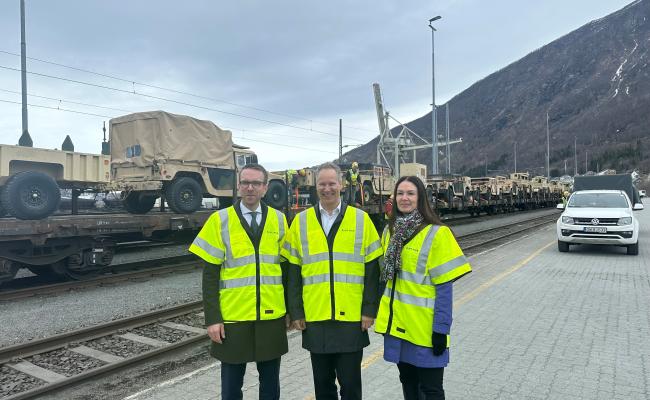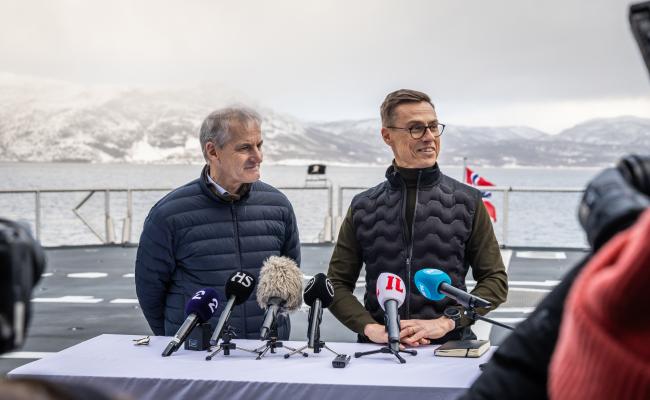Norway's MFA on All the Nordics in NATO: "The Significance Hasn't Quite Hit Us Yet"
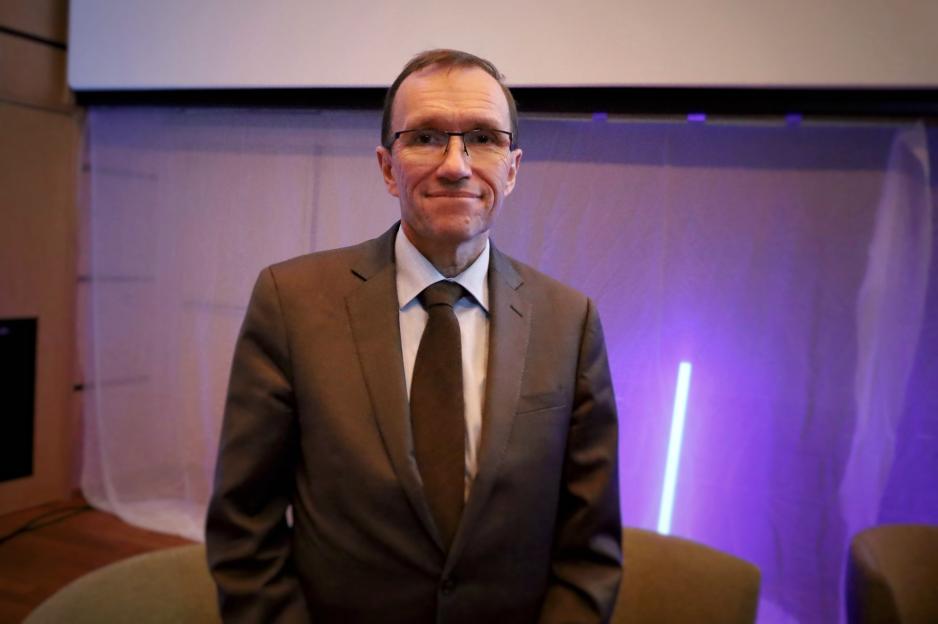
"According to Google Maps, it takes two hours and 18 minutes to get to Sweden from the University of Tromsø. It's right up there, isn't it? If you take the E6 north from here to Kirkenes, the EU and two new NATO countries are straight to the right the way up. Nordic cooperation is now taking on a completely new security policy dimension, and with that comes a great deal more," says Norway’s MFA Espen Barth Eide at the Response Conference in Tromsø, Northern Norway. (Photo: Astri Edvardsen)
Tromsø (High North News): With the new Nordic security policy community and close defense cooperation follows great opportunities for more interaction between Norway, Finland and Sweden also in other areas of society. "We have to learn how to take advantage of this," says Norwegian MFA Espen Barth Eide.
The Cap of the North – the northern parts of Norway, Sweden, and Finland – was long without set borders. People wandered freely across the area with ideas and resources.
Now, the Nordic defense cooperation within NATO, as well as the green shift, offers more border-crossing dynamics in the North.
"All barriers are gone. Now there is nothing to prevent us from cooperating closely with Sweden and Finland, as was partly the case when they were not part of NATO," said Norway’s MFA Espen Barth Eide (Labour) to High North News.
HNN meets the minister at the recent foreign policy conference Response in Tromsø, Northern Norway. It was organized by the Norwegian Ministry of Foreign Affairs and UiT – the Arctic University of Norway, aiming to think new about the country's foreign and security policy in the High North and the Arctic.
One of the central topics of the conference was the potential for enhanced cooperation in the north of the Nordic region, both military and civilian.
"If we are to be completely honest, which is wise to be from time to time, we have not been exploiting the Finland-Sweden dimension well enough, because we have been so focused on Russia. For good reasons. However, we have now been dealt new cards," says Barth Eide to the audience.
'Response – Norwegian foreign policy for a new time'
• This conference series was launched in the winter of 2023 by the Norwegian government. It is aimed to contribute to a broad debate about Norway's foreign policy prioritization in a dramatically changed international landscape.
• The series includes seven conferences across the country organized in collaboration with local knowledge institutions.
• The conference in Tromsø, focusing on politics in the High North and the Arctic region, is the only one placed in Northern Norway. It was titled "The world wants to go to the Arctic – what do we want?"
• The opening conference was held in Oslo, where issues relevant to the High North were also on the agenda.
Still of an unforeseeable scope
The entire Nordic region united in NATO, which materialized in March with Sweden’s formal accession, opens a horizon so wide that it is challenging to get an overview.
"Even the most enthusiastic of us have not grasped how big this is," says Barth Eide.
He draws upon history to illustrate the dimensions:
"Remember that Norway has no experience of having a land border with another NATO country. Now, we are more like the Benelux countries, Belgium, the Netherlands, and Luxemburg, namely close allies with immediate geographical proximity. We just have to learn how to take advantage of this – anything else would be silly," he says and continues:
"This is happening in the wake of a Nordic cooperation that has been a raging success. When the Nordic Council was established at the beginning of the 1950s and later followed by the Nordic Council of Ministers, the acknowledgment was that one was not to talk about security policy and defense, but precisely therefore about everything else, from a shared labor market to energy cooperation, which became world-leading: we became the first fully integrated energy region."
"The Nordic region was also described as a security community as early as 1957 by the political scientist Karl Deutsch. Because no one in their wildest fantasies thought that Sweden would attack us or that Denmark would attack Sweden, we could have a trust-based cooperation. And now we have – on top of this – a security policy community as allies. This is a big deal!"

"I participated in making the first Soria Maria declaration [forming the basis of Jens Stoltenberg's government in 2005, ed. note], stating that the High North is Norway’s most important strategic priority area. It still is. Things did not quite go as hoped [with respect to the cooperation with Russia, ed. note], but perhaps some unforeseen doors will be opened," says MFA Espen Barth Eide to the audience in Tromsø. (Photo: Astri Edvardsen)
Over to the civilian sector
The Nordic countries' defense relations – not least with regard to the High North – are currently being systematically strengthened within NATO and the Nordic Defense Cooperation (NORDEFCO).
The momentum is present, but which other areas of society are to be lifted up for border-crossing collaboration in the North? Which actors should be responsible for progress in the cooperation? And how will the efforts be framed and given resources?
"We are now looking at how the Barents Euro-Arctic Council can best contribute after Russia left the cooperation. The BEAC can play an important role as a forum for strengthened regional efforts for viable communities, the environment, and green business development between Norway, Sweden, and Finland,” said Barth Eide in the Norwegian parliament in March.
“Our foremost objective for the High North is for people to live good lives in a region continuing to be characterized by peace and stability. To do this, we believe there is a need to think anew about Nordic cooperation in the North. The now united Nordic region in NATO provides new opportunities – not only for the defense sector but also within business, infrastructure, research, and education,” he continued.
The questions above will take time to answer. The minister is also in Tromsø to get input on such new thinking (a few examples of which are presented below). Moreover, the responsibility for the High North policy was divided between the MFA and the Ministry of Local Government and Regional Development last year – and the Norwegian Barents Secretariat received a new mandate with a strong focus on cooperation with Sweden and Finland in the North.
However, Barth Eide might have some thoughts on which areas of cooperation in the civilian sector that should be elevated?
Building relations across borders
What should be the priority areas in a strengthened Norwegian-Swedish-Finnish effort for viable and robust communities in the North, as you see it?
"I believe that, for example, the UiT’s new cooperation initiative is a good illustration of building relations right across border to Northern Sweden and Northern Finland – that one looks for opportunities and arenas for interaction and that institutions get better acquainted with each other," says the MFA.
More specifically, he refers to the UiT – the Arctic University of Norway 2023 initiative to promote more dialogue and collaboration between academia, business, and politics across the entire Cap of the North.
This is framed in the format of 'the Arctic Five Extended' – which is based on a long-standing collaboration between UiT; Luleå University of Technology and Umeå University in Northern Sweden, as well as the University of Lapland and the University of Oulu in Northern Finland.
"This is something we in Oslo want to back up. We will both support what happens here in the North, but also communicate with Stockholm and Helsinki about doing more, shifting the focus that we have historically had on the Norwegian-Russian relationship more to the northern Nordic region," Barth Eide maintains and continues:
"I believe there are considerable synergy effects to gain within business development and energy, for example. And Sweden and Finland are EU countries, while Norway is an EEA country; we are part of the EU's green shift, and much of the coming green industrial development could happen here in the North."
Possible formats and alternatives for a more civilian and civilian-military collaboration across the Cap of the North
• Existing political cooperation bodies: The Barents cooperation with the intergovernmental Barents Euro-Arctic Council, the Barents Regional Council, and the Barents Regional Youth Council – with an international and a Norwegian Barents Secretariat; the Nordic Council, the Nordic Council of Ministers, Nordkalottrådet [the Cap of the North Council, ed. translation], the Arctic Mayors Forum and the Arctic Council.
• Border-crossing initiatives for cooperation can also be promoted by various actors at a local, regional, and national level with bilateral and multilateral designs – as the Arctic Five Extended and the new high-level Norwegian-Swedish-Finnish infrastructure collaboration illustrate.
Ripple effects
The upcoming large investments in national and Nordic defense will also be accompanied by supporting efforts and activity in civil society, Barth Eide points out.
"We know from our own experience that a lot follows when one invests in defense. More defense entails more people, more bases, greater acquisition of food, equipment, and services, and an increased need for better roads. For example, the Nordic ministers of transport have already started thinking about reinforcing the east-west axes between the countries for military reasons, but obviously of peacetime benefit to everyone else as well."
The minister returns to highlighting the “barrier break” for both deeper and more expansive Norwegian-Swedish-Finnish integration as part of being allies:
"What could hold us back is essentially removed. At the moment, I don't know exactly what that will mean. Still, it will at least entail cooperation on civilian preparedness and infrastructure in general, such as roads and perhaps railways, among other things. On the whole, we are looking for synergy effects," he maintains.
High-level political dialogue
Talking to Nordic colleagues is on Barth Eide's agenda, but must also fit into a busy schedule in an uneasy world where much is at stake.
At the end of April, he was scheduled to go to Helsinki for meetings with Finland's MFA Elina Valtonen and President Alexander Stubb (both in the National Coalition Party). The visit was postponed as the minister stayed longer in Saudi Arabia to link the Arab peace initiative in the war between Israel and Hamas closer to European countries, writes Altinget.
The planned agenda for the visit to Finland included discussions on, among other things, bilateral relations and topical regional issues – such as Russia's war against Ukraine, European security cooperation and current NATO issues.
"Finland and Norway has excellent close relations and our NATO membership has brought us even closer together. The Nordic countries are our most important allies and it benefits us all to have the possibility to exchange views on current foreign and security policy matters," said MFA Valtonen.
Seen from a Norwegian perspective, gaining insight into Finland and Sweden's interests and will to invest in more cooperation – not least on the Cap of the North – will likely be an important task going forward in order to realize the great potential.
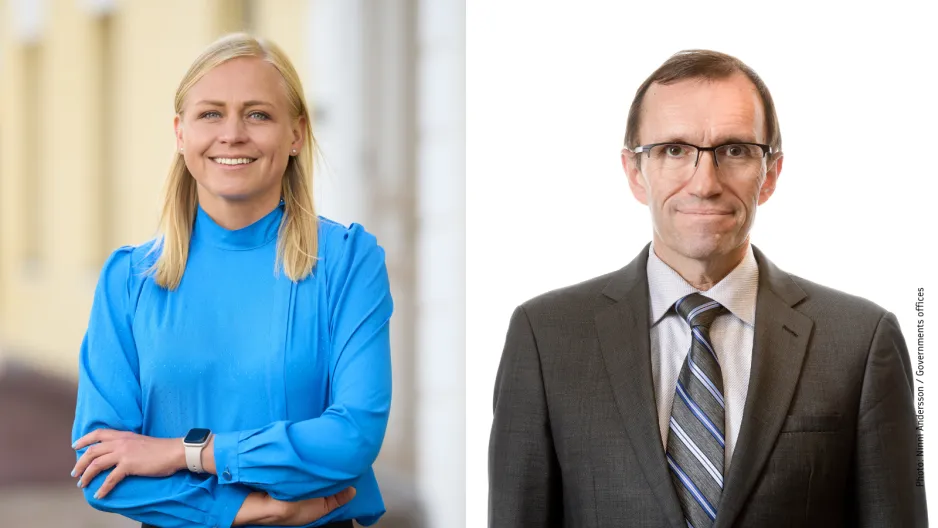
Finland's MFA Elina Valtonen awaits a visit from her Norwegian minister colleague Espen Barth Eide. (Photo: Finni Andersson/the Government Offices of Sweden; Cecilie Stuedal/the Norwegian Ministry of Foreign Affairs)
The need for knowledge
In learning how Norway can benefit from the new security policy community with our neighboring countries and its possible added value, there is also a need for further 'studies.'
On the Norwegian side, we must familiarize ourselves better with our neighboring countries at various levels and within different parts of society, Barth Eide clearly implies.
“We believe that Sweden and Finland are very much like Norway. Because when you drive across the borders, it looks quite similar, people look quite the same. And in Sweden you even understand what they are saying. It is not too difficult in Finland either if both know English. But they are very differently organized," he says and continues:
"We in the capitol Oslo are sort of the outskirts servers in Norway. We do our best to be there for the entire country. Now, I’m not going to say anything bad about our neighbors, but that is not your first thought when you arrive to work in Stockholm. Because these are countries that to a greater extent have thought that centralization is a good thing, while we believe in maintaining dispersed settlement and business in the entire country."
Framework of understanding
This means that the ways of organization between us and our closest – those who are most like us culturally, politically, and socially – are quite different. And that is something we must grasp when we think about border-crossing cooperation," the minister points out and continues:
"So, how do you meet your counterpart? You will always find a mayor. But does the mayor have the same [municipal-level ed. note] authority, or is the person in question more of a county mayor? If you find a landshövding [county governor in Sweden ed. note], does that official necessarily have the same set of authorities with the same instruments as here? No."
"So there is a challenge in learning to understand our neighbors anew. This is part of the security policy with NATO and Europe's green shift and how we exploit this to build opportunities," Barth Eide sums up.
Some of the input on Nordic cooperation in the North
"The North of the Nordic region has an established energy cooperation. It provides a good basis for further collaboration. The challenges we see partly revolve around a lack of a coordinated policy apparatus across borders. The Barents Secretariat's new framework is a very good start, but we would like more long-term project funding to also cover our partners across borders. We know that the path to establishing a strong cooperation is based on trust and ownership between the actors. If you fail to facilitate it, it could be like a flight from Tromsø to Luleå – where one must go via both Gardermoen and Arlanda [the main airports in Norway and Sweden ed. note]. We don't have time for that," says Petter Bjørkli, leader of the energy cluster Energi i Nord.
"The High North forms the core of Norway's security. But what do we do about this? We are yet to be as robust as we should be. We are trying to strengthen the defense forces, which is very important. But we lack critical infrastructure. We are struggling to populate the High North. We should not populate all areas and must into account the rights of the Sami and other minorities, but we must also bear in mind that we need people in critical positions. We are on the front line but not particularly prepared. We have to do something about this," says Gunhild Hoogensen Gjørv, Professor of Security and Geopolitics at UiT.
"The defense capability consists of the civilian society, total preparedness, and the capacities of the Armed Forces. What works in war must also work in peacetime. We cannot start building these structures after possible conflict and war have broken out. We must do this now through planning and cooperation. In this work, one must now also look across national borders. This means that state administrators, county councils, and municipalities have to sit down with the government to review the various areas to secure cross-border resources," says Nils Ole Foshaug, parliamentary representative (Labour) for Troms and member of the Standing Committee on Foreign Affairs and Defense.
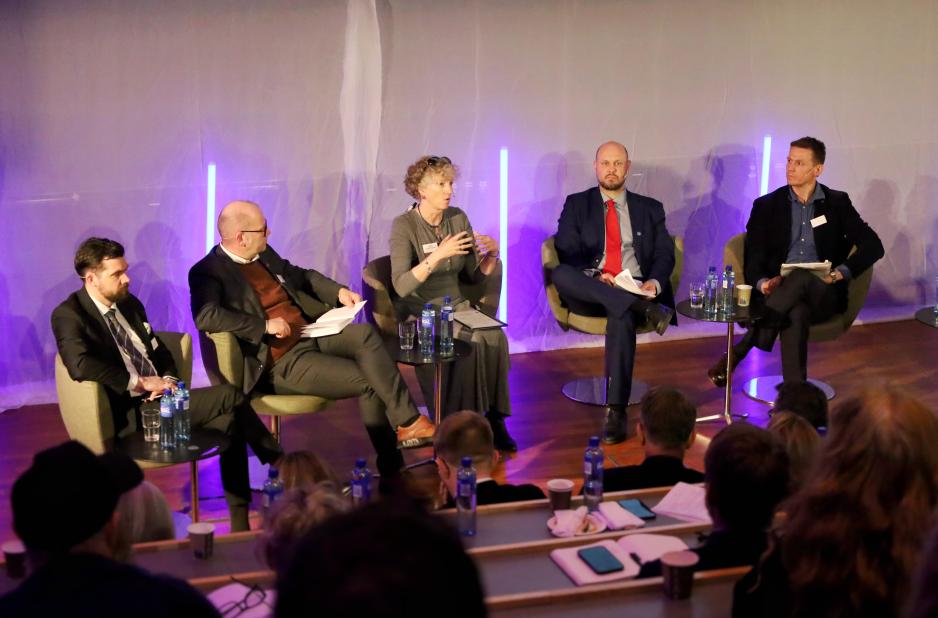
The panel that discussed Nordic cooperation (from the left): Petter Bjørkli, Cluster Leader, Energi i Nord; Nils Ole Foshaug, Norwegian MP and member of the Standing Committee on Foreign Affairs and Defense; Gunhild Hoogensen Gjørv, Professor of Security and Geopolitics, UiT; Dan Koivulaakso, Head of Department, Growth and Climate, the Nordic Council of Ministers – and Njord Wegge, Professor of Political Science, the Norwegian Defence University College. Carina Sammeli, Mayor of Luleå municipality in Northern Sweden, participated digitally. (Photo: Astri Edvardsen)
Relevant input
“These Respons conferences are important to us. There are many people from my ministry who sit and listen; they note ideas and other input. We use this in our work," maintains the MFA to the audience in Tromsø.
Barth Eide and his colleagues also received input on the following topics: Managing increased international interest in the Arctic, local perspectives to strengthen northern communities, and Russia in a new Arctic security policy context.
"All the conferences have been good, but this one has been spot on. So we take specific input with us for further adjustment and development of our High North policy," he says.




